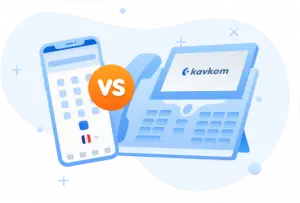The cordless VoIP phone, or Cordless phone IP, while it was a striking innovation in professional telephony, today faces competition from mobile applications and other digital integrations.
Thus, we will see in detail what the virtual alternatives of the wireless IP telephone are.
The wireless IP telephone, what are the other solutions?
For those who don’t already know, a VoIP phone uses VoIP technologies to place and transmit phone calls over an IP network, such as the Internet. Companies generally use this system which is more efficient than the old analog network. However, they have at their disposal a whole range of solutions for their
Wireless IP Phone
The most traditional choice is the wireless IP phone. Typically, cordless VoIP phones use a “base unit” to connect to a SIP provider or PBX phone system. The “handsets” then connect to the base unit using DECT or WiFi technology – depending on model and manufacturer’s brand. They come in different sizes and manufacturers.
Here are the brands and models most used by professionals:
- Yealink W60
- Fanvil X4G
- Grandstream GXP1625
However, wireless IP telephony remains a physical object unlike our other alternatives which are all dematerialized.
soft phone
The softphone, often confused with the webphone, is one of the tools of professional telephony. It is a software application that is installed on an internet-connected device to make phone calls.
In general, a softphone can access and enhance all of your VoIP features. That’s why many providers have built their own softphone interface to accompany
Webphone
Webphones are web applications that allow you to make phone calls directly in your Internet browser. What is the difference with the softphone will you tell me?
While the first is software that you need to install and configure, the second is an application. These Webphones completely replace the desk phones in your office.
Like the softphone, you have all the features of your phone system, such as the virtual number .
However, they are conditional on the subscription of a flat rate with a telephone operator.
Cordless VoIP phone the pros and cons
As we have demonstrated, the panel of choices is wide. To choose the most suitable solution for your business, you still need to do a comparative study to highlight the advantages and disadvantages of the wireless VoIP phone and its competitors.
The benefits of the wireless IP phone
Whether you work in a restaurant, retail, or just a small office, cordless phones can give users the freedom to move around without missing important calls. Most business VoIP phone manufacturers offer handsets and base stations that can be used together as an office phone solution.
The Disadvantages of Cordless VoIP Phone
However, if you’re a customer service or call-center company, working with VoIP virtual switchboards, you’ll need even more comfort, as your agents are constantly communicating with your customers.
In which case, an IP phone, even cordless, is not the best option for your staff.
You also need to take into account the mobility of your teams. In the age of telecommuting, Web applications and integrations make it easy to work anywhere, at the office or at home.
What about other solutions?
Dematerialized versions have many advantages. One of the main attractions of these solutions is based on the mobility of your services. In this way, an employee can continue to work remotely while enjoying the same advantages in terms of company telephony.
However, they are not free from drawbacks depending on your field of activity and the size of your company. The intrinsic mobility advantage of softphones, webphones and other web applications sometimes becomes a source of problems if you are not plugged into the mains. Indeed, since your virtual phone is installed on a computer or on a smartphone, the lack of battery or a breakdown can easily prevent you from making your calls.
Thus, all the options come from VoIP and are therefore to be preferred for professionals. Each type of company must then choose the solution best suited to its VoIP business telephony needs.






